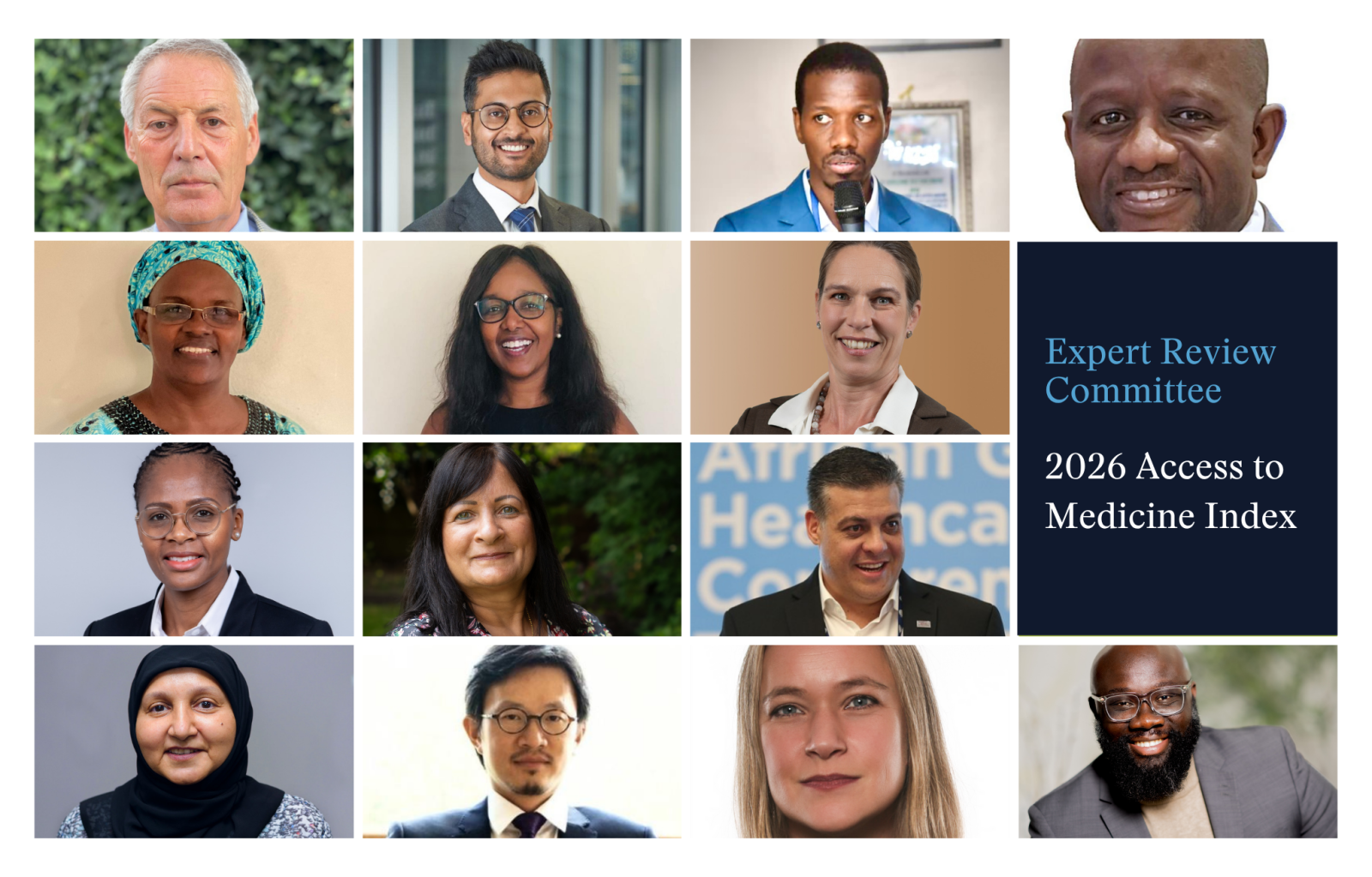Foundation names Expert Review Committee for 2026 Access to Medicine Index
Every two years, the Index research team assesses and updates the methodology for the Access to Medicine Index to keep it relevant, aligned with current global health challenges and impactful in advancing health equity. This process culminates in the convening of the Expert Review Committee (ERC), which plays a vital role in ensuring that the methodology – including any proposed changes – reflects expectations of large R&D-based pharmaceutical companies regarding how they address access to their products in low- and middle-income countries (LMICs).
Refining the 2026 Index methodology with expert guidance
Leading up to the ERC meeting, the Index research team has held extensive consultations with a broad range of stakeholders and experts – including pharmaceutical companies, international organisations, governments, non-governmental organisations (NGOs), academics and investors. These discussions have focused on aligning the Index’s methodology and metrics with expectations for how pharmaceutical companies can improve the availability and affordability of their products in LMICs.
At the same time, the Index research team has reviewed the 31 indicators used in the previous Index, focusing on factors such as their potential to drive change, how well they measure impact, clarity around roles and expectations for pharmaceutical companies and suitability for longitudinal analysis. By coupling this technical review with stakeholder consultations, the Foundation will enhance and update specific indicators. This will help ensure the upcoming 2026 Index remains a rigorous tool for assessing company performance – and continues to serve as an effective guide for driving meaningful change in access to medicine and reaching more people in LMICs with essential products.
What updates are being proposed for the 2026 Index?
In reviewing the Index methodology, the research team has considered how the analytical framework that underpins the assessment can be streamlined to sharpen focus on measurable impact. The Foundation has also examined how certain indicators can be updated or enhanced to continue effectively capturing how company actions are shaping access to medicine in a comprehensive way.
For the 2026 Index, major emphasis has been placed on assessing whether companies’ policies and commitments to expand access to medicine are being successfully translated into solutions that have positive effects on the lives of people living in LMICs.
“By zeroing in on what companies are actually delivering when it comes to increasing access for the most vulnerable, the 2026 methodology will spotlight the approaches that are truly making a difference while also exposing where urgent action is still needed. With this renewed focus, we can continue to push for meaningful company action to close persistent access gaps.”
To help guide and recognise companies' existing efforts, such as the adoption of large-scale, commercially viable approaches that ensure sustained access to affordable products in these settings, the Index research team has refined its definition of inclusive business models (IBMs).
In parallel, to further ensure the increased availability of essential products and build more resilient health systems in LMICs, the updated methodology also places greater focus on how companies ensure uninterrupted product supply and support local manufacturing – critical areas in light of ongoing supply chain challenges in many LMICs.
Building on indicators introduced in the previous Index, efforts have also been made to provide clearer criteria for evaluating how companies measure patient reach, with a stronger focus on quantifying the number of people reached with products via access efforts.
Now that the methodology review process is complete – with all feedback incorporated by the Index team – a final 2026 Index methodology proposal will be made to the ERC for discussion and endorsement in the 24 July meeting. In addition to proposals for the scopes, structure and analytical approach of the 2026 Index, the proposal will include points of consensus and disagreement identified during the review process. Through its strategic guidance, the ERC will help ensure the 2026 Index represents areas where industry analysis will have the greatest potential to influence and inspire changemaking, while also helping to make final decisions where uncertainty remains.
The 2026 Expert Review Committee
The ERC is composed of a diverse range of international experts with experience across access to medicine, public health and the pharmaceutical industry, reflecting the Foundation’s multi-stakeholder approach. Its members represent multilateral organisations, industry associations, governments, NGOs, patient groups, academia, and investors. Profiles of the 2026 ERC can be found here.

Chair of the Committee: Hans Hogerzeil, Emeritus Professor of Global Health at Groningen University (Netherlands) and Co-Chair of the first and second Lancet Commission on Essential Medicines Policies
Mayank Anand, Head of Non-Communicable Diseases (NCDs) and Maternal, Newborn and Child Health within the Health Investments team at MedAccess
Malick Anne, Head of the Division for Non-Communicable Diseases at the Ministry of Health and Social Action of Senegal and Lecturer and Researcher at Gaston Berger University of Saint-Louis
Richard Neci Cizungu, Executive Director of the Ecumenical Pharmaceutical Network (EPN)
Regina Mariam Namata Kamoga, Executive Director of Community Health and Information Network (Uganda) and the founding director of World Patient Alliance
Caroline Mbindyo, Chief Innovation Officer at Amref Health Africa
Mareike Ostertag, Special Adviser to the the International Federation of Pharmaceutical Manufacturers and Associations (IFPMA) Director General
Boitumelo Semete-Makokotlela, CEO of the South African Health Products Regulatory Authority (SAHPRA) and Chair of the African Medicines Regulatory Harmonization (AMRH) initiative
Seema Sondhi, Independent Market Access Consultant
Clinton de Souza, Co-Founder and General Manager of the Partnership for Improving Supply Chain Management in Africa (PICMA) and Managing Partner at Celsian Consulting
Fatima Suleman, Professor in the School of Health Sciences, University of KwaZulu-Natal and Director of the World Health Organization (WHO) Collaborating Centre for Pharmaceutical Policy and Evidence Based Practice
Kiu Siang Tay-Teo, Technical Officer, Department of Health Products Policy and Standards, World Health Organization (WHO)
Susan Winks, Head of Research Operations and Business Development at the Holistic Drug Discovery and Development Centre (H3D), University of Cape Town
Michael Benedict Yamoah, Director with Equity Ownership Services (EOS) at Federated Hermes
Once ratified, the 2026 Index Methodology will be published by the Foundation in October 2025 and will form the basis of the 2026 Access to Medicine Index, which is slated for release towards the end of 2026.
About the Access to Medicine Index
The Access to Medicine Index ranks 20 of the world’s largest pharmaceutical companies every two years by assessing their actions to improve access to medicine for people living in LMICs. It identifies best practices, highlights where progress is being made and uncovers where critical action is still required. In 2024, the Index covered 113 LMICs, home to over 80% of all people alive today. The companies in the 2024 Index account for around more than half of global pharmaceutical revenue. The Index is funded by the UK Foreign, Commonwealth and Development Office, the Dutch Ministry of Foreign Affairs, the Gates Foundation, The Leona M. and Harry B. Helmsley Charitable Trust, the Wellcome Trust and Stewart Investors.
